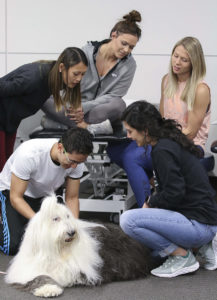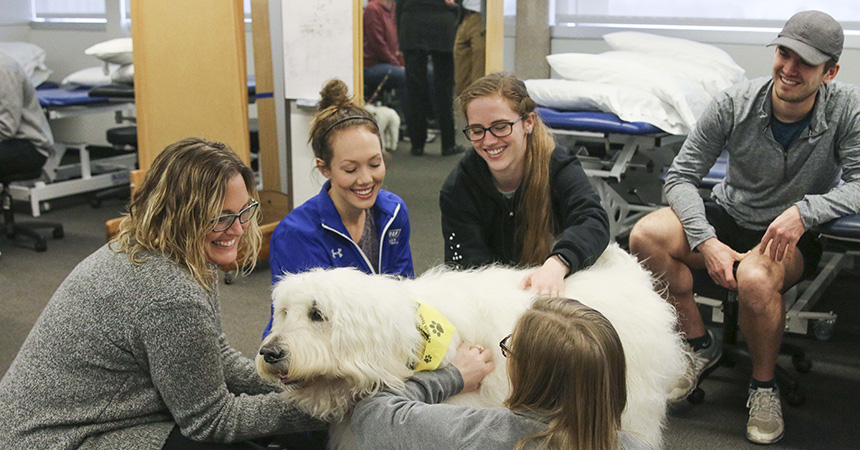Students learn to use animals to improve patient outcomes
By Diane Smith
Cokeita’s wavy hair spilled on the ground at the feet of several physical therapy students – she had no idea her tresses were a source of inspiration.
The students pondered a class assignment: How could they incorporate a relaxed Old English Sheepdog into physical exercises aimed at helping an injured construction worker bend or extend his wrist after surgery.
“In this case, a construction worker had a laceration to his forearm so deep that it cut his tendon,” explained Fritzi Quiñones, a second-year Doctor of Physical Therapy student at UNT Health Science Center.
The team used a real-life case based on a patient from a clinical rotation in an orthopedic outpatient setting. The patient’s daily activities included work and braiding his daughter’s hair.
Quiñones said physical therapy would improve the patient’s range of motion and help him return to daily activities at his prior level of function.
The group’s solution involved petting and braiding Coketia’s mane to improve dexterity.
“Petting the dog is another exercise that increases range of motion of the wrist – like being able to bend and extend it,” said Quiñones, who is among second-year physical therapy students taking Therapeutic Exercise II in the School of Health Professions.

The group assignment was part of a recent lecture focused on using animals to enhance patient outcomes in physical therapy.
“The whole idea of this is to teach the students how they can incorporate a dog into their therapeutic exercises to help the patient,” said Claire Peel, PT, PhD and Vice Provost of Academic and Faculty Affairs for the UNTHSC.
Dr. Peel is a physical therapist who has been involved with animal-assisted therapy since 2004. She works with a local chapter of Pet Partners, a non-profit, and with the university’s Paws at Lewis Library program.
Dr. Peel said activities such as petting a dog or manipulating a dog’s harness can improve fine motor skills. Animals can motivate patients to perform difficult tasks, she said.
“It helps distract clients from pain so they can be more active and engaged in physical therapy,” Dr. Peel said.
Animal-assisted therapy helps hesitant patients be more open to therapy, said Mike Richardson, PT, DPT, DHSc and Assistant Professor of Physical Therapy.
“It’s a unique way to engage with patients,” Dr. Richardson said. “It’s important to form those partnerships with patients and then we can tie it back to the therapeutic exercise that is what this course is all about.”
Cokeita, who wore a ponytail at the top of her head at the recent lecture, allowed student Caesar Ramirez to braid her fur as a class demonstration. The students grinned as they watched Cokeita – a scene students described as good for their well-being.
“What dog doesn’t make you happy, right?” Quiñones said, adding it was a welcome break in a rigorous class.
“We work really hard, and it is very challenging sometimes, but today was one of kind,” Quiñones said. “I was smiling throughout the whole lecture because I could turn around and see the dogs. It’s good for us too because we are super stressed.”







Social media